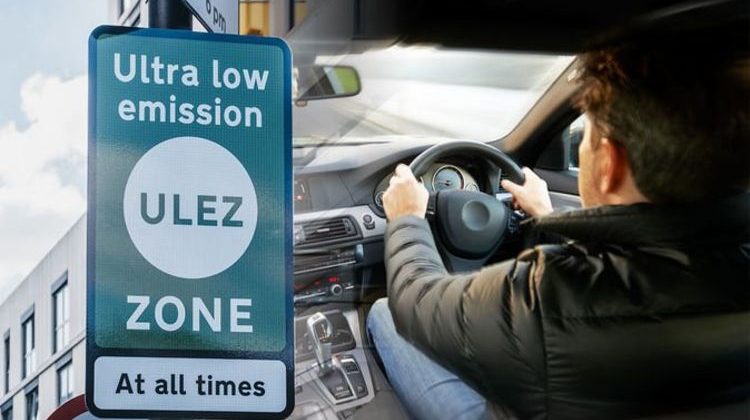ULEZ: Grant Shapps says it is a money raising scheme
We use your sign-up to provide content in ways you’ve consented to and to improve our understanding of you. This may include adverts from us and 3rd parties based on our understanding. You can unsubscribe at any time. More info
The Ultra Low Emission Zone (ULEZ) expanded from central London up to the North Circular and South Circular roads on October 25, 2021; an area covering 3.8 million people. Resident motorists, plus anyone else hoping to drive in the area, will now be required to pay a £12.50 daily charge to drive inside the zone if their car does not meet the ULEZ emissions standard.
The expansion comes amid a push to reduce emissions coming from the capital – part of the Government’s wider plan to tackle the climate crisis.
The Mayor of London says he hopes the expanded zone will put the capital on the path to be a net zero carbon city by 2030.
However, London is not the only city that has plans to introduce clean air charges for drivers.
Birmingham, Derby and Newcastle are all reported to be working towards a similar scheme.


In the wake of COP26, with the spotlight very much on the global climate emergency, Alex Kindred, a car insurance expert at Confused.com, spoke to Express.co.uk about other ways ULEZ and similar charges could impact motorists in the future.
He explained: “With the enforcement of ULEZ, we are no doubt expecting to see a big change to the automotive industry.
“Firstly, there’ll be a demand for cars with low emissions – meeting the set ULEZ standards will increase, which could potentially even increase demand for these vehicles and perhaps the second-hand market.”
Currently, TFL sets out ULEZ standards as “Euro 3 for motorcycles, mopeds, motorised tricycles and quadricycles (L category), Euro 4 (NOx) for petrol cars, vans, minibuses and other specialist vehicles. Euro 6 (NOx and PM) for diesel cars, vans and minibuses and other specialist vehicles.”
DON’T MISS
Drivers warned of winter driving law which could lead to a £1,000 fine [WARNING]
E10 fuel may affect ‘every petrol car’ [INSIGHT]
Drivers may not be aware E10 could ‘cost you more’ [COMMENT]
Petrol cars that meet the ULEZ standards are generally those first registered with the DVLA after 2005, although cars that meet the standards have been available since 2001.
Diesel cars that meet the standards are generally those first registered with the DVLA after September 2015.
Should the demand for such cars increase, Mr Kindred says it could have a knock-on effect when it comes to car ownership.
He said: “Naturally, this increases the cost of ownership and car valuations short to medium term, including depreciation.
increase in sales of BEV, PLEV and MLEV cars.”
According to the Confused.com expert, such changes might also affect what we pay towards our cars.
He told Express.co.uk: “Although the rules around ULEZ coming into force mean drivers may for now see an increase in expenditure on their vehicles and travel, we should also expect the enforcement of ULEZ to lower our vehicle costs in other ways.”
Car insurance, for example, could be set to change – although this will depend on how the motoring market evolves in the coming years.

Mr Kindred said: “As a wider demographic starts driving these new ultra-low emission cars – changing the general risk profile of these cars – then we can expect to see insurance pricing changes.
“However, as to which cars, and to what extent, it will be determined by market demand. For example, if younger drivers choose to drive specific cars.”
Road tax may also be heading for a shake-up, particularly if low-emission vehicles begin to dominate the roads.
The car insurance expert added: “Road tax is currently emission-based but it’s likely to change, as soon we see cars become more-emission free.
“Its likely tax might be based on battery efficiency or miles per charge – but again, this is to be decided by market demand, and we can never be certain on what to expect.”
Source: Read Full Article
